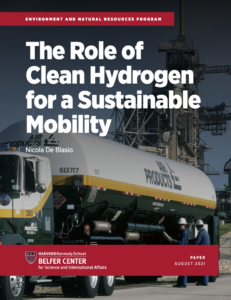Full Title: The Role of Clean Hydrogen for a Sustainable Mobility
Author(s): Nicola De Blasio
Publisher(s): Belfer Center for Science and International Affairs at the Harvard Kennedy School
Publication Date: August 6, 2021
Full Text: Download Resource
Description (excerpt):
Hydrogen and energy have a long-shared history. Although there have been false starts in the past, this time around, hydrogen is capturing unprecedented political and business momentum as a versatile and sustainable energy carrier that could be the missing piece in the carbon-free energy puzzle. Clean hydrogen produced from zero-carbon energy sources, such as renewable (green hydrogen) and nuclear power (pink hydrogen),1 appears ever more likely to play a prominent role in the global transition to a low-carbon economy.2
As governments and corporations become increasingly committed to addressing climate change and reducing emissions, they are placing greater emphasis on the deep decarbonization of energy-intensive “hard-to-abate” sectors, such as iron and steel production, high-temperature industrial heat, aviation, shipping, railway, and long-distance road transportation. These are areas where shifting to electricity as the preferred energy vector while decarbonizing its production may not be immediately feasible. At the same time, adoption of clean hydrogen at scale will depend on more than just its environmental benefits; economic, policy, technological, and safety factors must also be addressed.
This paper analyzes clean hydrogen’s potential for driving emissions reductions in the mobility sector, focusing on road transportation, shipping, rail, and aviation. Overall, transportation is the second-largest producer of global CO2 emissions, after electricity and heat generation,3 and one of the hardest sectors to decarbonize due to its distributed nature and the advantages provided by fossil fuels in terms of high energy densities, ease of transportation and storage.
